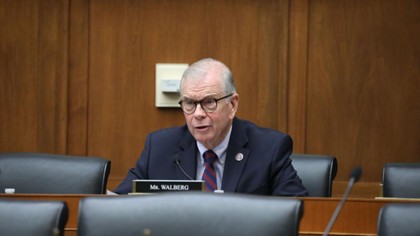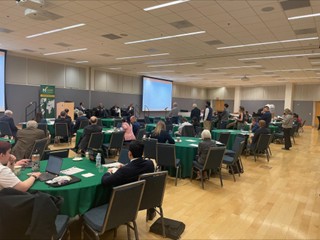Stratford University closure followed several years of problems with accreditor
Many college students who were on track to graduate from Stratford University are realizing they will need to redo some of their studies or end them entirely following the recent closure of the for-profit institution.
Mushiya Tshibaka, a former nursing student and mother of three, said she was only five classes shy of graduation when she got the news. Now, with few options to transfer most of her credits, she may have to start over.
“I don’t even know what to do,” said Tshibaka. “I’m just stuck.”
Tshibaka, who is working as a certified nursing assistant and was studying to become a rheumatology nurse practitioner, said she had been looking forward to a promotion after her graduation, but now “I don’t think that’s going to happen anytime soon.”
Stratford, which has been in operation since its founding as American Transportation Institute in 1976, offered degrees in business, information technology, culinary arts, hospitality, health sciences and nursing before it closed. It was briefly a member of the United States Collegiate Athletic Association and National Junior College Athletic Association, fielding teams for baseball, softball, women’s soccer and men’s basketball.
Then, on Sept. 23, the university announced it would close.
Earlier that week, the federal government had formally terminated its recognition of the school’s accrediting agency, the Accrediting Council for Independent Colleges and Schools, after it “failed to demonstrate it could effectively evaluate, monitor and enforce quality standards for schools.”
In a letter to students announcing the closure, Stratford President and CEO Richard Shurtz said conditions imposed on the school by the U.S. Department of Education, including a prohibition on new enrollments, made it “impossible to continue in operation.
But the ACICS decision wasn’t the only trouble Stratford has faced in recent years. The university had received a string of compliance warnings from its accreditor and become ensnared in several lawsuits, including one over whether a branch campus in Iraq was accredited.
However, some students said they missed the problems or were aware and decided to enroll anyway due to the school’s convenience.
Stratford shuts down schools in the South
In 2016, early signs of trouble emerged for Stratford. That year, Stratford lost its accreditation briefly when the federal government stripped ACICS of its recognition. Betsy DeVos, then-Secretary of Education in the Trump administration, later reinstated ACICS.
In 2018, the institution received multiple warnings from its accreditor over concerns that included not meeting standards for student achievement and data integrity, which focused on tracking retention and on-time graduation rates. The school also had a lawsuit, which was dismissed, over a sexual harassment claim.
Then, on May 8, 2019, Stratford announced its campuses in Virginia Beach, Glen Allen and Hampton Roads would be closing, citing “a dramatic shift in the U.S. education market to online programs” and growing international demand for the university’s onsite programs.
“In view of these shifts in the marketplace, we have decided to reduce our on-ground presence in the U.S. and expand online and internationally,” the school said in a statement.
Stratford still had campuses in Alexandria and Woodbridge in Virginia, as well as offerings online, in Baltimore, and in New Delhi, India.
Students at the time described themselves as “surprised” and “overwhelmed” by the announcement.
More than 500 students were estimated to be affected by the decision. One of the major concerns for students was finding an institution that would accept all their credits; many schools would not.
A troubled Iraq expansion
Court filings reveal that as Stratford operated a handful of campuses in the U.S. and India, Shurtz began exploring the possibility of a branch in Erbil in the Kurdistan region of Iraq.
In 2013, Shurtz entered into discussions with Saqi Barzani, co-founder of education company International Academic City, about the idea, but plans were derailed for a few years due to the country’s “unstable conditions.”
In June 2018, Barzani obtained approval from the Iraqi Ministry of Higher Education to establish the “American Stratford University’s branch in Erbil City.” The following month, International Academic City and Stratford drew up a preliminary agreement to “establish a fully accredited branch campus of Stratford University U.S.” in Kurdistan.
Problems soon arose, however. When Barzani and Shurtz had resumed their expansion discussions in 2018, Stratford was under an ACICS show-cause directive for “numerous” violations. Accreditation criteria set by ACICS in 2018 specified that “an institution under a show-cause directive or a negative action will not receive approval from ACICS for the initiation of any branch campus while the action is in effect.”
Emails included in court filings show confusion from Barzani over the status of the Erbil campus. Correspondence from Stratford representatives referred to the school as “only the Stratford Language Institute not a branch or university,” and said that “until and unless we can apply and obtain the approval for opening a branch campus in Erbil from our accrediting agency it will not be acknowledged as a Stratford Campus.”
Simultaneously, however, Shurtz wrote a letter to the Kurdistan Minister of Higher Education referring to Barzani as president “of the American Stratford University – Erbil,” while the school continued offering non-language coursework on subjects such as economics, accounting and programming.
In September 2019, acting on an anonymous tip accusing Stratford of misleading students, ACICS opened an investigation into the Erbil campus. Among the concerns eventually flagged by the accreditor was a YouTube clip of Shurtz stating to the Kurdish press, “I think one very important fact to understand is that Stratford University is going to offer the same quality programs here that we have in the U.S. That’s important because this is a fully accredited campus, and if this campus fails, I lose accreditation in all the campuses.”
Stratford disputed the claims and the significance of the YouTube clip, which the school said “unfairly and inaccurately” described the situation in Erbil. The university in turn accused Barzani of “improperly marketing University programs” to students without its knowledge or consent.
In February 2020, ACICS directed Stratford to cease enrollments at all campuses. At the same time, Barzani and International Academic City filed a complaint against Stratford and Shurtz, arguing the two had falsely led them to believe that the institution was accredited and that Stratford’s own accreditation would cover the branch in Erbil.
In an April 2020 court filing in response, Stratford said the parties “had not yet created a joint venture entity or sought approval for a branch campus” and accused International Academic City of having enrolled students in an “unauthorized branch campus” without the university’s approval. “When Stratford and ACICS learned of these actions, the Kurdish students were notified that the collegiate-level coursework offered by IAC was unauthorized and unaccredited,” the university wrote.
The two parties settled the case in October 2021. The terms of the settlement were not disclosed.
Shurtz did not respond to questions from the Mercury about the Erbil case or other claims made by students.
Student complaints
Some former students told the Mercury that they were aware of issues surrounding Stratford University before registering but had been assured they were resolved or had concluded the school’s benefits outweighed its past problems.
Students, some of whom were single parents, had full-time jobs or were older, said Stratford gave them the flexibility they needed and was close to their homes or work. Other students were from other countries or active-duty members of the military.
Stratford provided them a way to keep up with their responsibilities, get the education they wanted and take advantage of career opportunities.
“At the time I picked the school, they were not in jeopardy of losing their accreditation,” Tshibaka said.
In 2016, one student filed a complaint seeking compensation with the Office of the Attorney General in Virginia, arguing that they could not take two certification exams at another institution because Stratford’s “programs were not accredited with the appropriate organizations.”
The student said they had initially sought to study nursing but switched to a health information management program after finding out Stratford credits couldn’t be transferred to George Mason University’s nursing school.
“I asked about the program’s accreditation and was assured by the university that it was properly accredited,” they wrote in the complaint. “After enrolling in and completing courses in the program, I found out that it was, in fact, unaccredited.”
The complaint was forwarded to the State Council of Higher Education for Virginia (SCHEV). Records obtained from the council said that educational institutions determine which credits they will accept or reject, and are not required by Virginia Code to accept them.
SCHEV records further state that the student was dismissed from Stratford’s program for “poor academic performance” and the institution notified the student that the program they were entering was not accredited.
Altogether, SCHEV received 11 student complaints about the university dating back to 2013. Students expressed concerns about the university’s handling of administrative matters, including student loans, refunds and graduation requirements. Others expressed concern with the lack of response from staff and technical issues submitting assignments.
In two cases, Stratford admitted to an administrative error or informed students it would assist them with refunds. In the other cases, students were directed to complete the university’s grievance process, or the case was marked resolved after a check or response was provided by the school.
Currently, Stratford is facing a class-action lawsuit from a former student for allegedly failing to protect students’ personal data during a breach on April 6.
What happens next?
Stratford has told former students that accredited schools will accept the university’s credits on a case-by-case basis.
Students and officials from other institutions have said that not all credits are transferable. Two for-profit institutions, South University in Richmond and Chamberlain University College of Nursing and Public Health, have both expressed interest in enrolling the students. Chamberlain University President Karen Cox said the school will have to evaluate student credits on a case-by-case basis, but added, “We’re hoping to not slow people down in their efforts to become a bachelor’s-prepared registered nurse.”
Chamberlain was one of 110 schools included in the Sweet vs. Cardona class-action lawsuit that culminated in a proposed settlement this summer that would provide debt relief to students at the listed for-profit colleges. According to the settlement, the U.S. Department of Education “determined that attendance at one of these schools justifies presumptive relief” based on strong signs of “substantial misconduct by listed schools.”
Besides credit transfer worries, students said they are concerned about running out of federal aid and applying for loans.
Stratford will be completing a graduation plan for 42 nursing students who are in their last term, according to an Oct. 11 letter from the U.S. Department of Education. Students will finish on Dec. 23. Tshibaka, who still has five classes to finish and a capstone project, said she and her peers had started a petition to be included in the graduation plan. However, the students selected for the plan had fewer classes to complete.
West Virginia attorney Charles “Rusty” Webb, who is representing some former Stratford students, said Stratford’s closure “falls in the category of another for-profit, private school closing that causes devastation to the students.”
“Their priority is to make money, and if they educate someone in the process, that’s just collateral benefit. But their focus is to make a profit for their shareholders,” Webb said.
Joe DeFilippo, director of academic affairs for SCHEV, said when the U.S. Department of Education tightened regulations for financial aid and accreditor oversight under the Obama administration, for-profit schools were impacted significantly.
One regulation, for example, was the “gainful employment” rule requiring institutions to track their graduates’ employment progress. Under this rule, the federal government would stop providing financial aid to students if an institution’s trade programs were not working.
He said that for-profit schools found it difficult to operate under the changes.
“It just became more difficult to run those schools, and we probably had more of them than were needed,” DeFilippo said. “These schools were much more financially stressed and closures were much more common, and Stratford comes at the end of that trend.”
(Virginia Mercury is part of States Newsroom, a network of news bureaus supported by grants and a coalition of donors as a 501c(3) public charity. Virginia Mercury maintains editorial independence. Contact Editor Sarah Vogelsong for questions: info@virginiamercury.com. Follow Virginia Mercury on Facebook and Twitter.)
”



